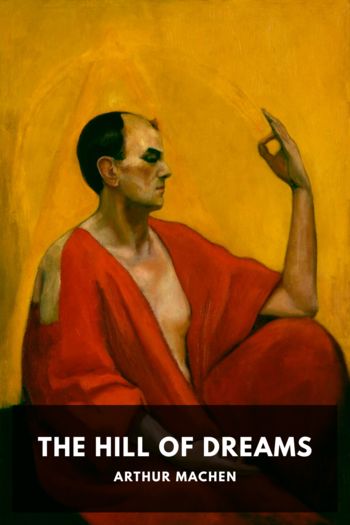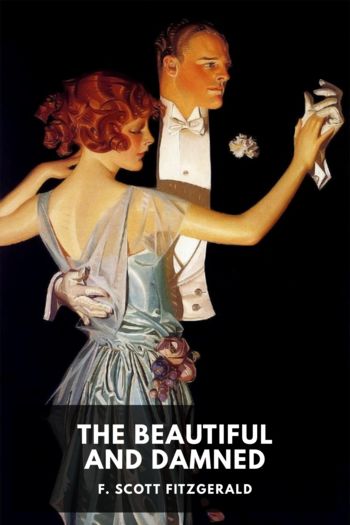The Hill of Dreams by Arthur Machen (best books for students to read .txt) 📕

- Author: Arthur Machen
Book online «The Hill of Dreams by Arthur Machen (best books for students to read .txt) 📕». Author Arthur Machen
A strange feature was the constant and fluttering motion of hands and arms. Gesture made a constant commentary on speech; white fingers, whiter arms, and sleeves of all colours, hovered restlessly, appeared and disappeared with an effect of threads crossing and re-crossing on the loom. And the odour of the place was both curious and memorable; something of the damp cold breath of the cave meeting the hot blast of summer, the strangely mingled aromas of rare wines as they fell plashing and ringing into the cups, the drugged vapor of the East that the priests of Mithras and Isis bore from their steaming temples; these were always strong and dominant. And the women were scented, sometimes with unctuous and overpowering perfumes, and to the artist the experiences of those present were hinted in subtle and delicate nuances of odour.
They drank their wine and caressed all day in the tavern. The women threw their round white arms about their lover’s necks, they intoxicated them with the scent of their hair, the priests muttered their fantastic jargon of Theurgy. And through the sonorous clash of voices there always seemed the ring of the cry:
“Look for the jar marked Faunus; you will be glad.”
Outside, the vine tendrils shook on the white walls glaring in the sunshine; the breeze swept up from the yellow river, pungent with the salt sea savour.
These tavern scenes were often the subject of Lucian’s meditation as he sat amongst the cushions on the marble seat. The rich sound of the voices impressed him above all things, and he saw that words have a far higher reason than the utilitarian office of imparting a man’s thought. The common notion that language and linked words are important only as a means of expression he found a little ridiculous; as if electricity were to be studied solely with the view of “wiring” to people, and all its other properties left unexplored, neglected. Language, he understood, was chiefly important for the beauty of its sounds, by its possession of words resonant, glorious to the ear, by its capacity, when exquisitely arranged, of suggesting wonderful and indefinable impressions, perhaps more ravishing and farther removed from the domain of strict thought than the impressions excited by music itself. Here lay hidden the secret of the sensuous art of literature; it was the secret of suggestion, the art of causing delicious sensation by the use of words. In a way, therefore, literature was independent of thought; the mere English listener, if he had an ear attuned, could recognize the beauty of a splendid Latin phrase.
Here was the explanation of the magic of “Lycidas.” From the standpoint of the formal understanding it was an affected lament over some wholly uninteresting and unimportant Mr. King; it was full of nonsense about “shepherds” and “flocks” and “muses” and such stale stock of poetry; the introduction of St. Peter on a stage thronged with nymphs and river gods was blasphemous, absurd, and, in the worst taste; there were touches of greasy Puritanism, the twang of the conventicle was only too apparent. And “Lycidas” was probably the most perfect piece of pure literature in existence; because every word and phrase and line were sonorous, ringing and echoing with music.
“Literature,” he re-enunciated in his mind, “is the sensuous art of causing exquisite impressions by means of words.”
And yet there was something more; besides the logical thought, which was often a hindrance, a troublesome though inseparable accident, besides the sensation, always a pleasure and a delight, besides these there were the indefinable inexpressible images which all fine literature summons to the mind. As the chemist in his experiments is sometimes astonished to find unknown, unexpected elements in the crucible or the receiver, as the world of material things is considered by some a thin veil of the immaterial universe, so he who reads wonderful prose or verse is conscious of suggestions that cannot be put into words, which do not rise from the logical sense, which are rather parallel to than connected with the sensuous delight. The world so disclosed is rather the world of dreams, rather the world in which children sometimes live, instantly appearing, and instantly vanishing away, a world beyond all expression or analysis, neither of the intellect nor of the senses. He called these fancies of his “Meditations of a Tavern,” and was amused to think that a theory of letters should have risen from the eloquent noise that rang all day about the violet and golden wine.
“Let us seek for more exquisite things,” said Lucian to himself. He could almost imagine the magic transmutation of the senses accomplished, the strong sunlight was an odour in his nostrils; it poured down on the white marble and the palpitating roses like a flood. The sky was a glorious blue, making the heart joyous, and the eyes could rest in the dark green leaves and purple shadow of the ilex. The earth seemed to burn and leap beneath the sun, he fancied he could





Comments (0)